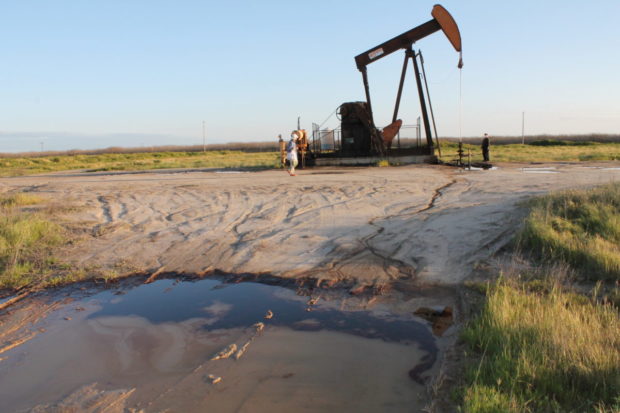
By Cherylyn Smith
(Author’s note: The following letter was submitted to the CARB and posted on its Scoping Plan Comments page on April 10.)
Although it is customary to opt for mitigations, offsets and increased regulations on methane when any discussion of the damaging effects of GHG emissions from methane operations are taken up, our recommendation to the California Air Resources Board (CARB) calls for a much bolder, more extensive action. These comments are centered on methane emissions from fracking, which are a major impediment to reversing climate change. Ultimately, they highlight the need to prioritize the elimination of fracking altogether, if California were to continue to follow a responsible, systematic and viable plan for reducing greenhouse gasses (GHGs) and for converting to renewable energy resources.
It has been established in an April 2011 Cornell University study and in subsequent research, conducted by Professor Robert Howarth, a Cornell geochemist, that methane possesses 86 times the heat-trapping capacity of CO2, in the first 15–20 years after it is released into the atmosphere (www.eeb.cornell.edu/howarth/publications/Howarth_2014_ESE_methane_emissions.pdf).
The same study estimates that fracking produces up to 30% more leakage of methane, throughout the entire production cycle, than conventional natural gas produces.
It is important to note that methane leakage has been, to a large degree, inaccurately measured in fracking operations. To this point, a 2015 Environmental Defense Fund 18-year study concluded that estimates of methane leakage in the Barnett Shale fields of Texas were, in fact, 90% higher than previously stated by the federal EPA (https://insideclimatenews.org/news/07122015/methane-emissions-texas-fracking-zone-90-higher-epa-estimate). Previously, a 2014 study by the National Academy of Sciences indicated that methane leakage from fracking may be up to 1,000 times greater than calculations reported by the EPA (www.pnas.org/content/111/17/6237.abstract).
Clearly, these studies lead us to conclude that fracking is a dire menace to our efforts to address climate change effectively.
Consequently, Professor Howarth went much further in explaining the role of fracking in global warming, following the Paris Climate Talks in November 2015. He asserted that in order to meet the global warming reduction targets delineated in the Paris Agreement, we must stop fracking now. The following is Professor Howarth’s statement against fracking, as reported by The Nation magazine:
If we continue with methane production at current rates, the world will run up against the 1.5-degree limit in 12 to 15 years. If we stop producing methane, which means stop doing fracking of natural gas and oil, the world wouldn’t run up against that limit for about 50 years. So we could buy ourselves 25 to 35 years of time, which is critical. That would allow us to improve our political and socioeconomic responses to climate change and decarbonize our societies accordingly. But if we’re serious about a 1.5-degree target, or even the 2-degree target, we can’t keep on fracking. (https://www.thenation.com/article/scientists-warn-paris-climate-agreement-needs-massive-improvement/)
With this information in hand, we urge the CARB to initiate a plan to phase out fracking in California and to declare that effort in its 2017 Scoping Plan. Such action is a critical step in formulating a strategy that will allow us a time advantage, so that every decision we make, in every sector of GHG reduction, will benefit from more thoughtful planning and implementation, in the future. It is the first step in establishing a truly strategic approach. To accomplish this, the elimination of fracking must be recognized as a pivotal element in our state’s approach to reversing climate change.
Although Professor Howarth’s comments are global in nature, our problems in California recently, with the accidental methane releases from the Aliso Canyon natural gas storage facility, for example, illustrate that methane leakage overall is a major obstacle to climate stabilization. Without a doubt, failure to control methane releases, from any source, is of further catastrophic consequence because it offsets progress we have made as a state, toward attaining the goals of AB 32. That, of course, translates into dollars and cents wasted and diminished returns in overall GHG reductions, as is the case from ongoing, cumulative leakage of methane from fracking.
The Aliso Canyon accident forces us to reevaluate the designation of natural gas as a “bridge” fuel—a somewhat euphemistic label that also has been applied to fracking. The money we would save by eliminating the concept of “bridge fuels” should be transferable directly to the development of sustainable sun, wind and water energy projects, and to more efficient fuels and transportation options (https://web.stanford.edu/group/efmh/jacobson/Articles/I/CountriesWWS.pdf). Seriously consider eliminating the so-called bridge fuels and bridge practices entirely as they have both demonstrated the devastating effects that methane releases have on global warming patterns and on a rigorous transition toward renewable energy sources.
In closing, should this board adhere to the concept of “bridge” fuels/practices, would it not be in keeping with that belief to introduce a phase-out plan as early as possible, in order to maximize the funding for renewable clean energy sources from this point on? It is crucial that CARB does just that. We, the undersigned, urge you to enact a basic plan for the phasing out of fracking and any so-called transition fuels within the current scoping plan so that the stated goals of AB 32 can be facilitated and achieved without delay.
Sincerely,
Cherylyn Smith, Vice President; Ron Martin, President
Fresnans Against Fracking
Nayamin Martinez, MPH
Director, Central California Environmental Justice Network (CCEJN)
Women’s International League for Peace and Freedom (WILPF), Fresno Chapter
Stan Santos
President, Communications Workers of America; Fresno, Madera, Tulare, Kings Central Labor Council
Tom Frantz
President, Association of Irritated Residents, Kern County
*****
Cherylyn Smith is an environmental activist with Fresnans Against Fracking and climate/energy chair with the Tehipite Chapter of the Sierra Club. Contact her at cherylynsmith@aol.com.
